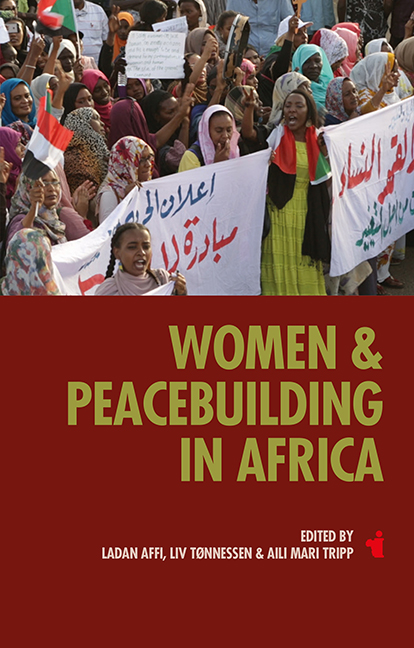Book contents
- Frontmatter
- Contents
- List of Illustrations
- Notes on Contributors
- Acknowledgement
- Abbreviations
- Maps
- 1 Introduction: The Gendering of Peacebuilding in Africa
- 2 Women Activists’ Informal Peacebuilding Strategies in South Sudan
- 3 ‘Ba Sa Jin Mu’ (They Don’t Listen to Us): Women and Peacebuilding in North-Eastern Nigeria
- 4 No Going Back: Somali Women’s Fight for Political Inclusion
- 5 Sudanese Women’s Demands for Freedom, Peace, and Justice in the 2019 Revolution
- 6 The Fight for Democracy and Women’s Rights in Algeria: A Long Legacy of Struggle
- 7 Conclusions: Women’s Peace Activism in Africa
- Bibliography
- Index
2 - Women Activists’ Informal Peacebuilding Strategies in South Sudan
Published online by Cambridge University Press: 26 May 2022
- Frontmatter
- Contents
- List of Illustrations
- Notes on Contributors
- Acknowledgement
- Abbreviations
- Maps
- 1 Introduction: The Gendering of Peacebuilding in Africa
- 2 Women Activists’ Informal Peacebuilding Strategies in South Sudan
- 3 ‘Ba Sa Jin Mu’ (They Don’t Listen to Us): Women and Peacebuilding in North-Eastern Nigeria
- 4 No Going Back: Somali Women’s Fight for Political Inclusion
- 5 Sudanese Women’s Demands for Freedom, Peace, and Justice in the 2019 Revolution
- 6 The Fight for Democracy and Women’s Rights in Algeria: A Long Legacy of Struggle
- 7 Conclusions: Women’s Peace Activism in Africa
- Bibliography
- Index
Summary
Introduction
Two years after South Sudan was declared Africa's youngest nation in 2011, the country descended into civil war. Political rivalry and ethnic tensions between Dinka supporters of President Salva Kiir and Nuer supporters of his Vice President Riek Machar, both members of the Sudan People's Liberation Movement (SPLM), culminated in an armed conflict with devastating consequences for the country. The women of South Sudan participated in the formal peace negotiations as representatives of women's groups, civil society, academia, and youth groups, and others as representatives of political parties. In the 2015 peace negotiations, women made up 15 per cent of the delegates, while in 2018 there was a significant increase to 25 per cent representative of women as delegates (CFR 2020b). Women lobbied the negotiators and ultimately were seated at the peace table (Pepper 2018).
Their participation in the formal peace process enabled the inclusion of significant gender provisions in the final peace agreement, such as the 35 per cent provision for women's political representation. Women's informal peacebuilding strategies were equally important. Not only were women able to mobilise for the inclusion of women in formal negotiations and bring attention to the need to include gender-sensitive provisions in the peace treaty, they also mobilised for peace at the community level.
Increasingly, researchers and peace activists have recognised the role of women and women-led organisations in building peace in Africa (Jendia 2020; Westendorf 2018; Hilhorst and van Leeuwen 2005; Porter 2007; Hedstrom and Senarathna 2015; Mazurana et al. 2002). However, there is a dearth of literature on women's participation in peacebuilding in Africa's youngest nation. The scholarship on South Sudan is scant. Notable exceptions include Jackie Kirk (2004) on the role of female teachers in peacebuilding in South Sudan during the North–South civil war. Some scholars have focused on women's exclusion from the formal peace processes during the negotiation of the comprehensive peace agreement between the North and South Sudan in 2005 (Westendorf 2018) and at the start of the peace negotiations in South Sudan in 2013 (Mayen 2013). There is also some scholarship on women's leadership and participation in politics (Arabi 2011; Dahlstrom 2012) and the birth of women's movements in the context of armed conflict (Edward 2019).
- Type
- Chapter
- Information
- Women and Peacebuilding in Africa , pp. 29 - 52Publisher: Boydell & BrewerPrint publication year: 2021

